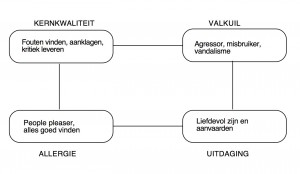Norwood
Robin Norwood is de grondlegster van de Norwood-vrouwengroepen en auteur van ‘Women who love too much’, in het Nederlands vertaald met ‘Als hij maar gelukkig is’, met als ondertitel ‘vrouwen die teveel in de liefde investeren’ en dat is precies wat de beschreven vrouwen doen: investeren, dus zakendoen met berekenend gedrag om rendement te halen en dat is helemaal geen liefde.
Een betere titel voor het boek zou zijn geweest: ‘Women who control too much’ of in het Nederlands: ‘Als hij maar verandert’. De beschreven vrouwen zijn allemaal uit op controle en dominantie en manipuleren hun partner, die hen gelukkig moet maken, omdat ze zichzelf ongelukkig en leeg voelen en codependent zijn, zonder dat te beseffen.
Robin noemt die vrouwen aantrekkelijk, capabel en intelligent, ik vind dat het opsokkelen van losers die ernstig getraumatiseerd zijn en geen enkele zelfreflectie aan de dag leggen. De partner deugt niet en die zullen ze wel even ‘redden’ en ‘verbeteren’ en veranderen, een nogal aanmatigende, belerende en arrogante houding die een overcompensatie is van minderwaardigheids-gevoelens die zo eigen zijn aan codependentie. Ze projecteren hun eigen ellende op hun partner die hen alleen maar spiegelt(soort zoekt soort)
Norwood schrijft over een vrouwelijke cliënt die zegt: ‘Maar hoe kon ik weten dat ik hulp nodig had?, ik dacht dat ik het allemaal prima deed!’. Rumi zei: ‘Wie in zichzelf geen gebreken ontdekt is zijn eigen vijand’ En dan is er geen liefde maar haat en zelfafkeer, die gespiegeld wordt door de partner die ze kiezen. Ze kiezen voor het bekende en dat is vijandschap en zelfafkeer. M’n vriend Peter de Kock zei: ‘Codependentie is in oorlog zijn met jezelf’ en vele auteurs en wijzen delen die mening met hem. Als je in oorlog bent met jezelf kom je dus ook in oorlog met je partner ‘t is besmettelijk. Wat die vrouwen, what Norwood is talking about, dan doen is de partner de schuld geven, die deugt dan niet en dan vluchten ze naar een nieuwe relatie, zonder iets geleerd te hebben en maken weer dezelfde fouten, niet erg intelligent.
Norwood schrijft:’Omdat we niet van onszelf kunnen houden hebben we hem nodig om ons ervan te overtuigen dat we het waard zijn om liefgehad te worden’ Dat is heel onintelligent gedrag. Bovendien is het zo dat als hij zegt dat hij van de vrouw houdt, ze hem niet zal geloven omdat ze niet eens van zichzelf houdt, dus hoe kan iemand wel van ‘r houden?. Daar komt nog bij dat als je niet van jezelf houdt je niet eens in staat bent om van een ander te houden, het is onmogelijk, dan ga je in plaats van teveel liefde te geven controleren, domineren, verbeteren, veranderen naar je eigen beeld en dat is geen liefde. Een Amerikaanse actrice zei het heel mooi ze zei dat een vrouw haar partner zo lang probeert te veranderen tot zo hem niet meer moet.
” Het succes van de liefde,
ligt in de liefde zelf
– niet in het resultaat van de liefde.
Het is natuurlijk dat we in de liefde graag het beste voor de ander wensen, maar of dit nu zo uitdraait of niet, doet niets af aan de waarde van de liefde die we schonken.”
Mother Teresa
Norwood schrijft over een vrouw die te zeer liefheeft: ‘Ik voelde met sterker, wijzer en wereldser dan hem’, dat is de vergelijkingsval en superieur denken, waar minderwaardigheid aan ten grondslag ligt. Als je je meer voelt dan je partner is er al geen gelijkwaardigheid meer en is dat pathologisch gedrag. Als de Norwood groepen zich baseren op het boek van Robin Norwoord houd ik m’n hart vast voor de desastreuse gevolgen. Al de beschreven vrouwen vertonen codependent gedrag en zouden meer naar hun eigen aandeel moeten leren kijken om tot heling en genezing te komen, zouden meer aan zelfreflectie moeten doen en hun schaduwkanten moeten leren zien en erkennen en transformeren. Freud zei: ‘De mens is beter dan hij weet, maar slechter dan hij denkt’ En Lao tse zei:’Mooie woorden zijn vaak niet waar en ware woorden zijn vaak niet mooi’. Norwood sokkelt de vrouwen op door ervan uit te gaan dat zijn teveel lief hebben en dus goed zijn, waar het tegendeel waar is. Nietzsche waarschuwde al voor de ‘goeden’ hij zei dat het de giftigste vliegen zijn die steken


